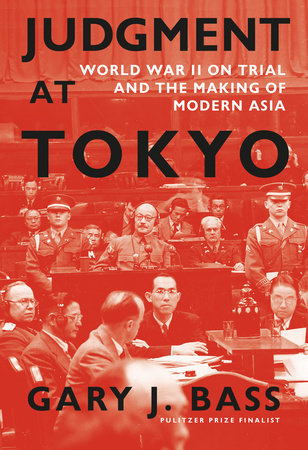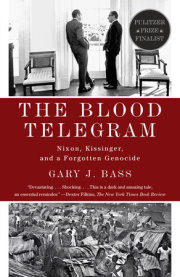THE NEW YORK TIMES NONFICTION BOOKS TO READ THIS FALL • THE WASHINGTON POST BOOKS TO READ THIS FALL • FINANCIAL TIMES WHAT TO READ THIS YEAR • NPR BOOKS WE LOVE
“Comprehensive, landmark and riveting. . . . Bass employs the complexities of the trial as a fulcrum to sketch a wide canvas. . . . Fascinating.”
—Robert D. Kaplan, The Washington Post
“A magisterial history. . . . A grand account. . . . Bass . . . has done a great service by spending a decade researching and writing what will surely be the definitive history . . . . Authoritative. . . . Few studies will be so balanced. . . . The book is a well-crafted, warts-and-all account from which almost no one emerges unscathed.”
—Bill Emmott, Financial Times
“Exhaustive and fascinating. . . . Placing the trial firmly in the context of colonialism, racial attitudes, the Cold War, and post-colonial Asian politics, Bass argues, quite rightly, that the trial ‘reveals some of the reasons why a liberal international order has not emerged in Asia.’ . . . Bass is right to keep returning to the question of race.”
—Ian Buruma, The New Yorker
“The word ‘monumental’ is used by reviewers rather too often, but in this case it is entirely deserved. . . . Outstanding and detailed. . . . Compelling and deeply humane. . . . Shows prodigious research, with documents mined in a range of languages, including Chinese and Japanese, as well as interviews with the children and grandchildren of several of the justices. The book is also written in flowing prose that describes characters as well as processes, and illuminates the links between both. . . . One of the most powerful elements of Bass’s book is his determination to . . . make the story an Asian one.”
—Rana Mitter, Times Literary Supplement
“Magnificent. . . . Profound. . . . Judgment at Tokyo encourages a deeper understanding of the Asian experience. . . . Bass has deeply studied the intersection of human rights ideals and politics; a past life in journalism . . . brings clarity and sparkle to his text. Judgment at Tokyo is written with the gravity the topic deserves, yet with winks of wit. . . . Vivid. . . . His contribution extends far beyond Tokyo in the 1940s, shedding light on an enduring debate.”
—Jennifer Lind, Foreign Affairs
“Every so often, a new work emerges of such immense scholarship and weight that it really does add a significant difference to our understanding of the Second World War and its consequences. Judgement at Tokyo is one such, a monumental work in both scale and detail, beautifully constructed and written, leaving the reader not only moved but disturbed . . . . A landmark work—capacious, intelligent and fair. . . . Fascinating and creditably even-handed. . . . Bass proves their significance every bit as forensically as the best courtroom lawyer. . . . Political leaders and military commanders around the world should read this book—and, with a bit of good sense, hurriedly learn the cautionary lessons it holds.”
—James Holland, The Telegraph
“With impeccable scholarship and lucid writing, this is a magnificent book on an aspect of Asian history that has far-reaching repercussions today.”
—The Baillie Gifford Prize for Non-Fiction
“A meticulously researched and authoritative account. . . . Mr Bass’s assertion that the tribunal’s failure played an important and largely negative role in the making of modern Asia is true.”
—The Economist, Best Books of the Year
“Powerful. . . . Judgment at Tokyo is meticulously researched, and Mr. Bass tells the story in crisp and compelling fashion. . . . Mr. Bass crosscuts neatly between the tribunal and the events leading up to it. . . . The book also carries relevance for the current moment.”
—Tom Nagorski, The Wall Street Journal
“[A] massive, magisterial work. . . . Bass has written an important book.”
—Max Hastings, The Sunday Times
“Bass has written a massively long and detailed book, always lively and judgmental. He brings out not only the legal arguments, but the colour of the great tribunal itself. . . . A balanced account. . . . [S]harp sketches of the protagonists.”
—Neal Ascherson, The Guardian
“This comprehensive treatment of the prosecution of Japanese war crimes after World War II is an elegantly written and immersive account of a moment that shaped not just the politics of the region, but of the Cold War to come.”
—The New York Times, 100 Notable Books of 2023
“A massive, magisterial account. . . . Bass is a marvelous writer. He has a sharp, clear eye for telling detail. . . . Readers will learn a great deal about a fascinating time that saw the collapse of Western empire in the Far East, the rise of Communist China, and the astonishing birth of a modern, peaceful, democratic Japan.”
—Evan Thomas, Air Mail
“The definitive scholarly account. . . . A compelling work on the politics of East Asia.”
—Aryeh Neier, The New Republic
“Elegantly written and comprehensive. . . . It is written with the panache of a journalist who knows how to pace a scene. . . . Dramatic.”
—The New York Times Book Review
“A riveting account of this lesser-known piece of Asian history . . . . Through his vivid storytelling, he . . . exposes the dilemma between idealism and pragmatism.”
—NPR
“A breathtakingly ambitious and well-executed piece of history, unlikely to be bettered. . . . This magisterial account—long but never sprawling; thick with detail yet always engrossing. . . . Bass’ account is at once pacy—as befits a courtroom drama—and even-handed. . . . Informed by an impressive amount of archival work and interviews undertaken across the world.”
—Christopher Harding, History Today
“A diligently researched, deftly argued, and lucid account. . . . Absorbing.”
—Sumit Ganguly, Foreign Policy
"A groundbreaking new book."
—Suzy Hansen, New York
“Rich and encompassing. . . . Detailed but never dull. . . . The behind-the-scenes moments that are one of the great joys and strengths of his book. . . . The great benefits of the extraordinary range of archival and interview work undertaken by Bass.”
—Prospect
“Captivating. . . . Insightful. . . . A scrupulous and comprehensive account.”
—The Japan Times
“A superb analysis.”
—Scott D. Sagan and Gina Sinclair, Bulletin of the Atomic Scientists
“A decade in the making, this account of the 1946-48 Tokyo war crimes trials shows how the Japanese reckoned with the brutal legacy of the Second World War.”
—The Telegraph, 10 Essential Books of the Year
“Bass has produced an immense work, highly readable and full of human interest. He has drawn on much fresh material. . . . Most absorbing. . . . Vivid. . . . The Tokyo trial is less well known to Western readers than its Nuremberg counterpart, but Bass’s book will undoubtedly do much to correct that imbalance.”
—Philip Snow, Literary Review
“Essential reading. . . . In Gary J. Bass it has found the ideal story teller. Bass, combining elegance of language with wonderful forensic skill, brings out how different the war in Asia was.”
—Mihir Bose, The Irish Times
“[A] monumental new book. . . . A vivid blow-by-blow account of the trial, filled with colourful characters and moments of farce as well as tragedy. . . . Judgement at Tokyo is based on a mountain of court records, government archives and interviews with the descendants of the judges and defendants, and Bass skilfully weaves all this together into a fascinating narrative.”
—Tessa Morris-Suzuki, Inside Story (Australia)
“A brilliant, exhaustive and astonishingly comprehensive history of the trial, including the events leading up to it, and its long-term repercussions for Asia. . . . The result of some 10 years of painstaking research covering 18 archives in no fewer than seven countries, and relying also on thousands of pages of material in Chinese and Japanese, as well as numerous interviews with the descendants of some of the key dramatis personae, his account has the vividness of direct reportage (Bass is a former journalist for The Economist), combined with the scholarly rigor of a writer deeply steeped in the primary and secondary literature.”
—John Nilsson-Wright, Global Asia
“Magnificent. . . . A stunning new book. . . . This may be the most comprehensive account of the Japanese military’s atrocities. . . . He goes much further than other writers and enhances the reader’s understanding.”
—National Review
“Comprehensive. . . . Superb. . . . Fascinating original research. . . . A real contribution. . . . Gary Bass’s work has been defined by the goal of offering an unsentimental look at the power politics of the postwar era.”
—Lawfare
“The broad framing and wide-ranging sources enable the author to weave a richly textured epic-scale story of the Tokyo Trial against the historical backdrop of Asian decolonization. . . . This book is particularly adept at bringing to light the competing visions of Asia’s past, present, and future. . . . The author’s superb storytelling skills . . . vivify the court proceedings and behind-the-scenes drama. . . . It raises the standard in the craft of narrating to a new level. . . . The sources consulted by the author are unprecedented in terms of their breadth and diversity.”
—Yuma Totani, H-Diplo
“A welcome addition. . . . Highly engaging and accessible. . . . Bass makes good use of archival resources and interviews, and the level of detail is particularly impressive. . . . The book is particularly strong on the Chinese contribution to the trial. . . . It provides an engaging way into a massive subject, without ignoring its complexity.”
—Neil Boister, Australian Outlook
“For the first time, Bass . . . gives Tokyo the kind of epic treatment that Nuremberg has gotten. . . . Bass has assembled a sweeping narrative that moves fluidly from courtroom transcripts to capsule discussions of legal philosophy.”
—The Nation
“Unfailingly lucid and intelligent. . . . Deeply researched. . . . It will surely become the standard account.”
—Commonweal
“A very brilliant book. . . . A drama for our time.”
—Forskning & Framsteg (Sweden)
“A rewarding read because its human dramas are enacted in the theatre of world history. Its size is a deserved monument to the author’s effort, and his prose a tribute to the journalistic flair he learned as a former writer for The Economist. . . . Bass challenges these conclusions by injecting drama into all levels of his narrative.”
—National Business Review (New Zealand)
“Well-written and thoroughly documented, the book is scholarship at its best. . . . Judgment at Tokyo deserves high praise. . . . An important book that deserves to reach a wide audience.”
—Journal of Military History
“Gary Bass has written nothing less than a masterpiece. With epic research and mesmerizing narrative power, Judgment at Tokyo has the makings of an instant classic on China, Japan, and beyond. It reads as if Robert Caro unleashed his powers of historical illumination on the moral questions that drive Asia’s volatility today.”
—Evan Osnos, National Book Award–winning author of Age of Ambition: Chasing Fortune, Truth, and Faith in the New China
“Gary Bass sets for himself a hugely ambitious goal: to tell the astonishing story of the Tokyo trial while placing the courtroom drama in the broader Asian and world history. He succeeds marvelously. Judgment at Tokyo is a vivid and meticulously crafted account, rich in detail, fair-minded, superbly nuanced. An indispensable book for understanding a key historical moment, one with resonances down to our present day.”
—Fredrik Logevall, Pulitzer Prize-winning author of Embers of War: The Fall of an Empire and the Making of America’s Vietnam
“In this superb, beautifully written work of transnational history, Gary Bass uses the Tokyo trial to illuminate the making of the modern world. Based on a staggering amount of archival research, the book provides rich insights into the origins of the Cold War, the emergence of postcolonial China and India, the rebuilding of Japan, and the waning of European imperialism.”
—Ramachandra Guha, author of Gandhi: The Years That Changed the World
“To understand the dynamics of post–World War II Asia, Judgment at Tokyo is fascinating, essential reading. Bass tells the story through vivid portraits of the participants—Chinese, Japanese, American, British, Indian, Filipino, among others—producing an elegantly written and deeply researched history of an underreported chapter.”
—Barbara Demick, Baillie Gifford Prize–winning author of Nothing to Envy: Ordinary Lives in North Korea
“Judgment at Tokyo is a work of singular importance—one that manages to be balanced, original, human, accessible, and riveting. It is of huge relevance to our times in the search for a decent place for ideas about justice in a world of double standards and patent hypocrisies.”
—Philippe Sands, Baillie Gifford Prize–winning author of East West Street
“A remarkable achievement from Gary Bass—smart and analytical, told at a high intellectual altitude, while narrated in gripping fashion. This is history that matters, asking big questions about justice for the crimes of World War II while presenting a cast of fascinating characters.”
—Susan Glasser, coauthor of The Divider
"Deeply researched. . . . Bass turns our focus to the negotiations in Japan after World War II. A sweeping two-year drama in and of itself, the trial also created conditions that continue to reverberate throughout Asia."
—The Washington Post
“A monumental history. . . . An authoritative account. . . . A towering work of research resurrects a pivotal moment in history.”
—Kirkus Reviews (starred review)
"Impressive. . . . Bass astounds with his ability to tie so many complex narratives together. This is a clear-eyed look at a pivotal period in world history."
—Publishers Weekly (starred review)
“Magisterial. . . . A massive history that captures a pivotal moment in Asian history.”
—Library Journal









